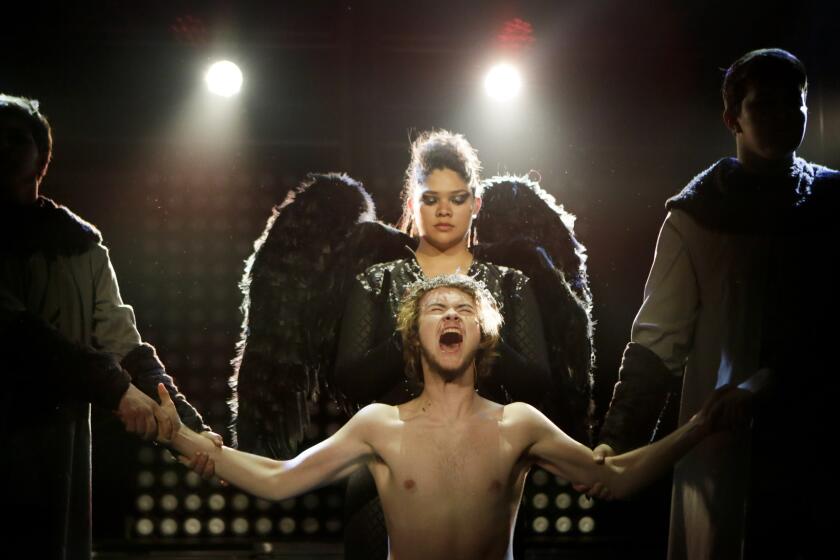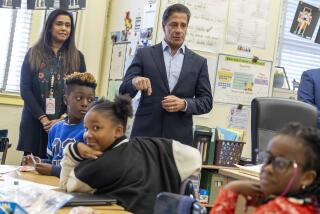The day coronavirus canceled prom and everything else for an L.A. high school singer

Estefani Lopez is a junior at the Los Angeles County High School for the Arts. Before the pandemic, she commuted more than three hours from Riverside to East L.A. on a typical day.
When the sky is still dark with night, Estefani Lopez awakens.
Her mother, Azucena “Susy” Lopez, prepares the day’s lunch in the kitchen while Lopez, 17, brushes her teeth in the bathroom and carefully inserts her contacts, her eyes still heavy with sleep. It is Thursday, March 12, one day before Los Angeles school officials will announce school shutdowns to slow the spread of COVID-19 and a week before Mayor Eric Garcetti’s Safer at Home order.
On this day, like so many others during the school year from Monday to Thursday, at 5:30 a.m. on the dot Lopez and her mother bolt out of their Riverside home and drive 20 miles north to San Bernardino Depot, where Lopez catches the Metrolink to the Los Angeles County High School for the Arts (LACHSA) in Los Angeles’ Eastside.
It’s a 1 ½-hour commute to school, and the train is nearly always prompt, departing exactly at 6:03 a.m. Any minor morning delays at home could cause Lopez to miss the train. And that would mean her mother has to drive more than 50 miles to drop her off at school on time, then drive another 50 miles home. In traffic.
So sometimes, Lopez worries.
“¿Estamos bien de tiempo?” Lopez asks her mother in the car, looking out the window at the dimming stars. “Are we OK on time?”
“Sí,” her mother reassures her sweetly. “Estamos muy bien de tiempo. No hay tráfico.” “Yes. We’re doing great on time. There’s no traffic.”
Lopez is a junior studying music at LACHSA, a free public high school that offers rigorous, conservatory-style training to students preparing for careers in dance, theater, music (vocal and instrumental), visual art and cinematic arts.
ALSO: High school performing arts were shut down by coronavirus. Will it derail students’ careers?
Four days a week since freshman year, Lopez has set her alarm at 5 a.m. and rushed out the door to attend the distinguished school on the campus of Cal State L.A., where school starts at 8 a.m. (On Fridays, classes don’t begin until 10 a.m., so she relishes a little extra sleep.)
On a normal day, Lopez gets home from school around 7 p.m. But some days, if she’s rehearsing for a performance, she’s at school until 6 p.m. And on tech weeks, she doesn’t leave campus grounds until 9:30 p.m., arriving home around midnight.
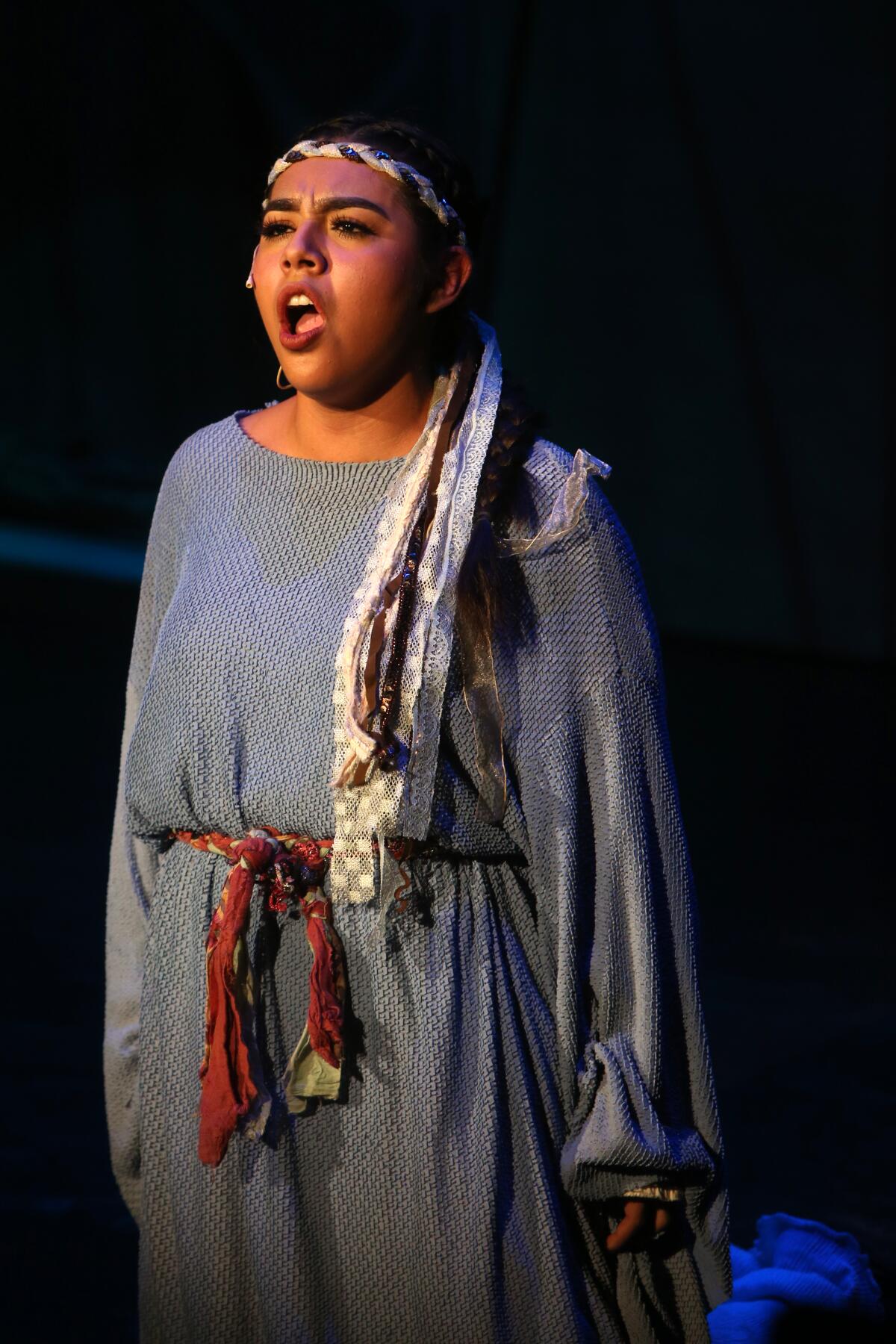
Every year, about 900 students from more than 90 cities and 40 school districts in L.A. County and beyond audition and submit portfolios for about 150 spots for ninth and 10th graders across all the specialties.
Few students, however, commute as far as Lopez.
Before stepping out into the chill of the March morning, Lopez and her mother pray for health and safety. For frontline workers of the coronavirus. For those who have fallen ill from COVID-19 to recover. And Azucena asks God to take care of her daughter.
“Wherever we go, we pray you’re with us,” she says in Spanish.

Inside the train, Lopez and LACHSA freshman Aydalet Ramirez from Banning walk to their usual booth and car, the one that doesn’t get too cold in the mornings or too hot in the afternoons, Lopez says. Plus, the others she says, “smell weird.”
Lopez has remarkably steady hands. When she doesn’t catch up on homework or squeeze in some sleep during the ride, she does her makeup. “It’s therapy for me,” she says. Glitter is her favorite.
Her eyebrows are always first. (“You’re going to see me with some crazy eyebrows,” she says laughing, lining her dark brows with a brush. “It’s just a warning.”) Her eyelids come next. She closes one eye and gently brushes a peach-colored powder on it, talking nostalgically about the 1990s. “I wish I was born in 1998,” she says, holding up a small cracked mirror. “My sister listened to a lot of R&B and that was a good time for that. Those were the good days.”
Lopez has long dreamed of being a singer.
At age 7, she started playing the violin. When she was 12, Lopez made it to the final rounds of Telemundo’s “La Voz Kids” and won third place in “Tengo Talento, Mucho Talento” in 2017. This year, Lopez and 19 other LACHSA students were invited to perform “I Sing the Body Electric” at the Grammys alongside megastars like Cyndi Lauper, Camila Cabello and Common. She also won this year’s Music Center Spotlight Award in classical voice, a scholarship and an arts training program for Southern California students that comes with a $5,000 reward. Plus, she has a YouTube channel where she posts videos of herself singing (mostly) Spanish songs for her 28,700 subscribers.
“I make my dad really proud because he wanted to be a musician in Mexico,” says Lopez, whose father, Joel, abandoned his dream after moving to the United States from San Luis Potosí, Mexico, in 2003.
Just after 7:20 a.m., Lopez steps off the train and hops on a short bus ride that drops her off just steps away from her high school. If she’s lucky, she has a few minutes to spare before classes begin.
First stop: French class.
Then it’s musical theater after nutrition, where for the next three hours or so, Lopez and her classmates rehearse for the school’s production of “West Side Story.” (The original plan was drastically changed after schools closed because of the coronavirus.)
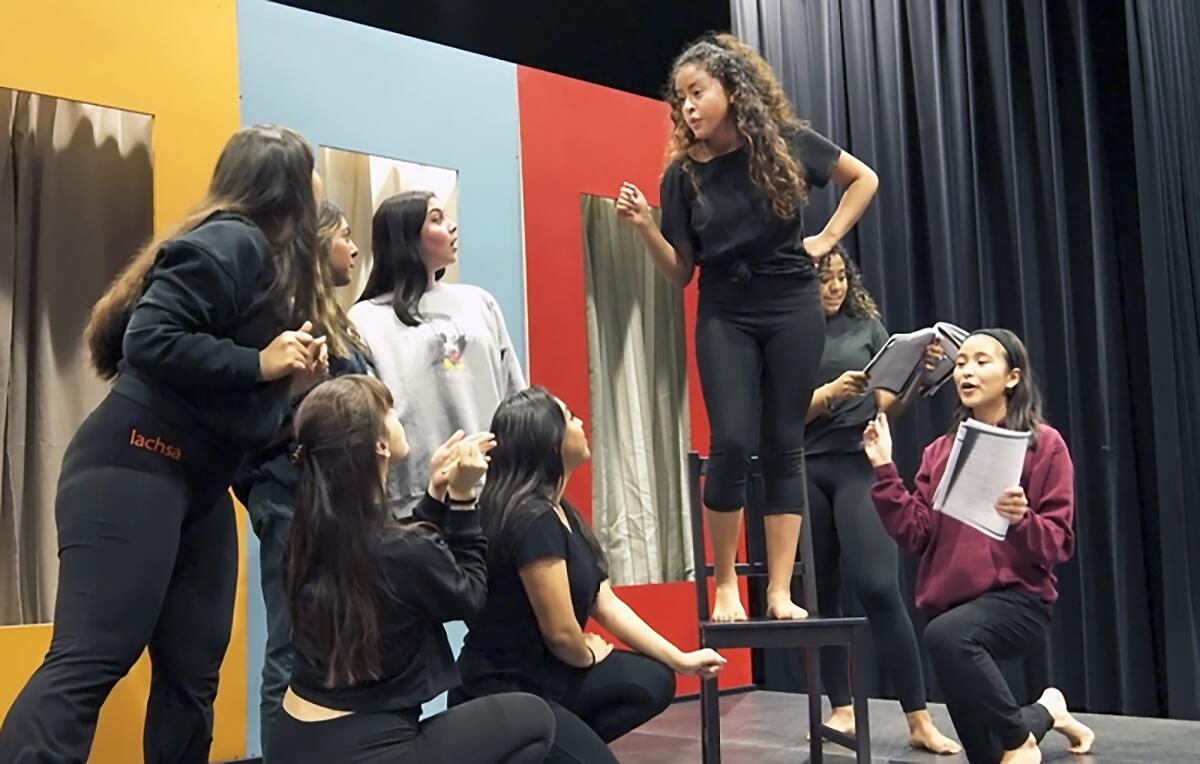
“Can we do homework?” a student asks theater chair Lois Hunter from the bleachers at the start of class. “Because I really need to catch up.”
Hunter, stern yet loving, points to him and says: “If you miss one cue, I’m going to call every college you applied to and tell them.”
Gathered around a piano inside the theater, music director Cassandra Nickols Gonzalez strikes chords while students warm up their voices, buzzing their lips and meowing octaves. Then, spread out across the theater, they stretch and do planks and jumping jacks to Pharrell Williams’ “Happy” and Miley Cyrus’ pop hit “Party in the U.S.A.”
It was shaping up to be a regular day at school, but midway through class a wave of gasps and curse words quietly echoed through the theater: Prom, scheduled for the following day, was canceled. The seniors were devastated, angry and confused.
Lopez was supposed to go to prom too, but she knew she still had next year. “I feel really bad for the seniors,” she later says.
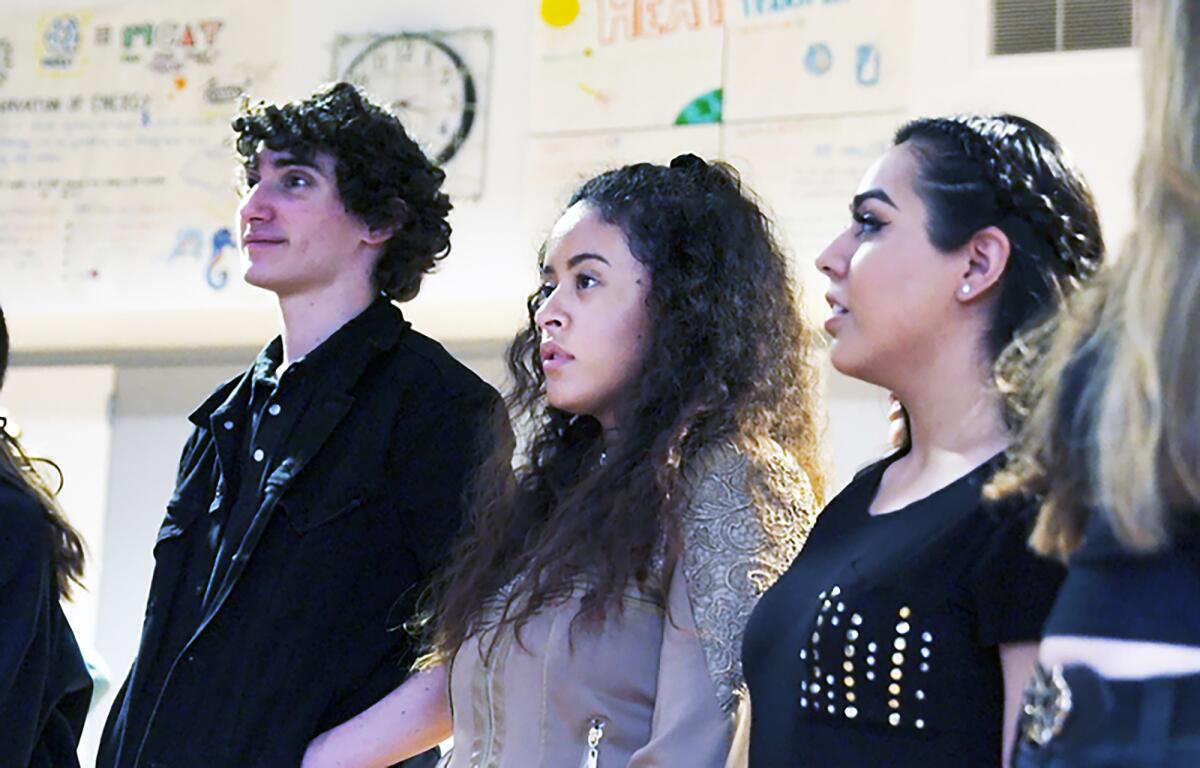
Before dismissing students for lunch, Hunter addresses the prom’s cancellation and the uncertainties around the production they’ve worked tirelessly on. “These are rough and different times,” she says, “and we have to be there for each other.”
Standing near her classroom’s doorway, opera teacher Suzanna Guzmán hands Lopez and her peers disinfectant wipes. No way is the coronavirus getting into her classroom. Guzmán is dynamic and animated, and she expects the best from her singers. Always.
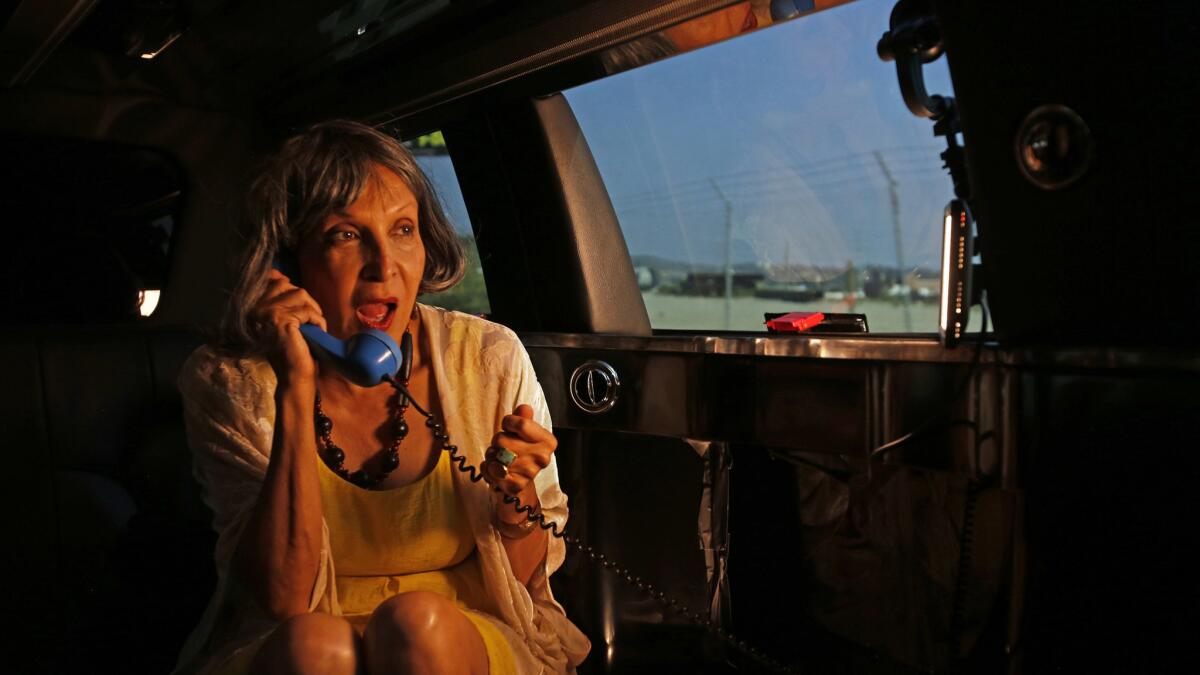
“Don’t settle for fine,” she reminds her students before starting practice for “Star-Crossed Love,” a production that was scheduled for last month. “Be great.”
For the next several hours, until 6 p.m., the students do their best, all things considered.
Back on the train, Lopez looks out the window, the sky a vivid pink and orange. On the ride back home, she often fights the urge to nap. She fell asleep on the train once and missed her stop; she won’t let it happen again.
When the train arrives, she’s tired, but she still has mariachi practice.
Inside Arizona Middle School a few blocks from Lopez’s home, practice is already in full swing. Her instructor, “maestro” Antonio Castañeda, knows to expect Lopez’s tardiness.
The young singer walks hurriedly to the empty chair on stage, picks up her violin, and starts to play “Aires del Mayab” with her five band mates, two of whom are her siblings. For the next hour, until 9:30 p.m., the six young musicians fill the auditorium with music, their parents sitting idly by, beaming with pride.
By 9:45 p.m., Lopez is finally home.
But before sitting at the dining table to eat molletes with her family, Lopez changes into her pajamas and can be heard singing in her room.
“Sigue cantando. Todo el dia Estefani esta cantando,” Azucena says with a smile. “She keeps singing. All day, Estefani sings.”
Still, the long days and nights haven’t been easy for Lopez. “It’s really, really hard,” she says. At times she’s thought about quitting, about attending a school closer to home.
“I don’t know how I’ve been doing it these past years,” she says, laughing nervously. “There’s definitely been a lot of emotional stress. A lot of crying.”
After coronavirus crisis shuttered schools, high school shows were canceled. For many performing arts students, it feels like a blow to their future.
But she’s pushed through it. Because she knows her hard work will pay off and because she’s long dreamed of being a singer. “Honestly, I feel like that school is going to help me a lot in my future,” she says confidently.
Of course, Lopez’s daily routine came to a grinding halt on March 16 when schools closed their physical doors and classes moved online to curb the spread of the coronavirus.
These days, her alarm goes off at 7:30 a.m. She has breakfast, brushes her hair and teeth, and only puts on mascara if she feels like it.
She has a full day of Zoom classes, and enjoys homemade lunches with her mom and sister. She’s still rehearsing for a condensed, virtual version of “West Side Story,” which she says is “going relatively well,” all things considered.
“We’re trying to do our best out of a bad situation,” she says, and is excited to see how the alternate production plays out.
After school at 4 p.m., she has more time to do homework and practice her singing. The mariachi practices and occasional gigs have ceased indefinitely.
But despite the many disappointments brought on by the pandemic, Lopez’s confidence has flourished. She’s still pursuing her dream of being a mariachi and opera performer, but she’s shifted her focus to opera.
A look at the high school sport standouts whose seasons were cut short by the coronavirus outbreak.
“After winning Spotlight, it has really encouraged me to pursue [opera] more,” she says. “Prior to Spotlight, I really thought that because I started so late, I wasn’t able to reach those goals. I just felt like people who started training younger in opera were going to be more successful.”
The prize proved her wrong. “[Winning] really brought me to my senses,” she says.
With a newfound confidence, she knows that day will someday come.
Lopez’s achievements and big dreams, though, wouldn’t be possible without her parents’ support and the major sacrifices they’ve made.
Her mother quit her job working in a store two years ago so she could tend to her three children. The hours were inflexible and conflicted with their schedules.
“I couldn’t work sometimes. It was complicated because I wasn’t given permission [to leave work] and they wouldn’t give me the hours I wanted, so I stopped working,” Azucena says in Spanish. Now, two or three times a week, she helps a friend clean houses while her daughter is in school.
The family learned of LACHSA through a friend whose son attended the L.A. school. When they researched it, they were impressed by its breadth of options and prestige.
“The school seemed great … and we figured that if she’s going to prepare [for a singing career] then she should be well prepared,” says Azucena. “When we see her with so much ambition, so much enthusiasm for being at the school, we see that it’s worth it.”
“Estoy super, super orgullosa de ella,” Azucena says enthusiastically, “I’m super, super proud of her.” And as often as she can, she makes sure to tell her daughter that. She wants her to know how much she admires her. That she’s a star.
More to Read
The biggest entertainment stories
Get our big stories about Hollywood, film, television, music, arts, culture and more right in your inbox as soon as they publish.
You may occasionally receive promotional content from the Los Angeles Times.
